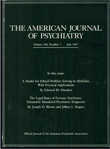Factitious psychosis: phenomenology, family history, and long-term outcome of nine patients
Abstract
Factitious psychological symptoms are defined in DSM-III as symptoms that are under the patient's voluntary control. Using specific criteria for the presence of voluntary control, the authors identified a cohort of 9 patients with factitious psychotic symptoms from among 219 patients consecutively admitted to a research ward for psychotic disorders. The phenomenology and family history of the patients suggested that they were a homogeneous group. All had similar DSM-III personality disorders, and most had a remarkably poor long-term outcome.
Access content
To read the fulltext, please use one of the options below to sign in or purchase access.- Personal login
- Institutional Login
- Sign in via OpenAthens
- Register for access
-
Please login/register if you wish to pair your device and check access availability.
Not a subscriber?
PsychiatryOnline subscription options offer access to the DSM-5 library, books, journals, CME, and patient resources. This all-in-one virtual library provides psychiatrists and mental health professionals with key resources for diagnosis, treatment, research, and professional development.
Need more help? PsychiatryOnline Customer Service may be reached by emailing [email protected] or by calling 800-368-5777 (in the U.S.) or 703-907-7322 (outside the U.S.).



